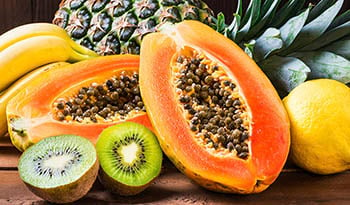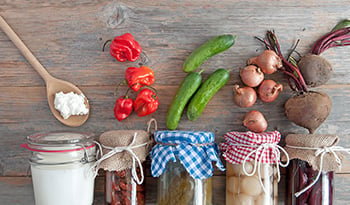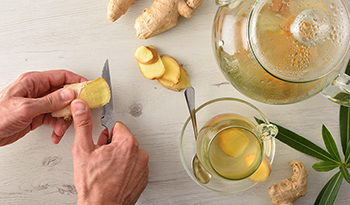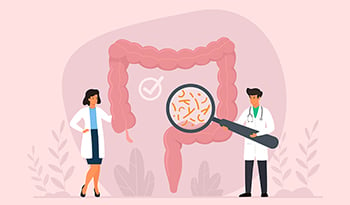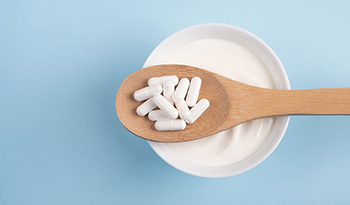Gut Health Tips For The Holidays: Support a Happy Gut This Season

It's that time of year again. Before you know it, festive lights, company parties, and family feasts will all be here with holiday cheer. Many believe the best part of holiday fun is the food.
However, if you follow a particular diet or keep strict eating habits, this time of year can be challenging to stay focused and aligned with your dietary beliefs. With cookies, cakes, and champagne galore, nothing can wreak havoc on your gut health more than the holiday season.
Fortunately, there are numerous natural remedies for holiday digestion that can help you feel at your best, even if you indulge a little. Let's discuss some holiday gut health tips that can help you and your gut make it through the season's best meals in a healthy way. We will explore supplements for digestive health and other natural remedies for holiday digestion.
The Gut Microbiome
The gut microbiome is a complex community of trillions of microorganisms, including bacteria, viruses, fungi, and other microbes, that reside in your digestive tract. It is a diverse ecosystem with over a thousand different species of bacteria alone. This diversity is crucial for maintaining a healthy gut environment.
Emerging data suggests a connection between the gut microbiome and mental health, often referred to as the gut-brain axis. The microbiome can influence mood and cognitive functions either positively or negatively depending on whether the gut flora is balanced or imbalanced.
This has particular significance during the holidays when many people feel depressed during what should be a joyous time of the year. Loneliness, loss of loved ones, and seasonal affective disorder (SAD) can all contribute to feelings of depression during the holiday season.
The gut microbiome is affected by many factors, including:
- diet
- environment
- antibiotic use
- stress
- sleep
- genetics
These elements result in everyone having unique gut microbiomes. Some signs of unbalanced gut bacteria can include upset stomach, bloating, unintentional weight changes, and fatigue.
Let's take a look at the best supplements and lifestyle choices that can help make your holidays healthy and bright with proper digestion support.
Supplements to Support Gut Health
Here are the top 5 supplements for digestive health during the holidays.
Probiotics
Consuming probiotics for holiday eating is a must. Probiotics are live microorganisms that can change the composition of your gut microflora. Studies suggest that probiotics may significantly affect the makeup of the gut microbiome and positively impact other areas of health, like immunity.
Probiotics help maintain a healthy balance of gut bacteria by increasing the number of beneficial bacteria and reducing harmful ones. This balance is crucial for optimal digestive function.
Common sources of probiotics include fermented foods like yogurt, kefir, sauerkraut, kimchi, and probiotic supplements. Try incorporating them throughout the week to prepare your gut for the holiday weekend party food.
Prebiotics
Prebiotics are fibers that fuel probiotic bacteria growth in the gut. Prebiotics provide "food" meant to promote the growth of beneficial bacteria in the gut microbiome.
Prebiotics are non-digestible fibers that travel to the colon, where they are fermented by gut bacteria. This fermentation process produces short-chain fatty acids that provide energy to colon cells and support overall gut health.
Some excellent sources of prebiotics include garlic, onions, bananas, asparagus, and whole grains. You can also get prebiotics in supplement form. Try adding prebiotics to your supplement routine for digestive help during the holidays.
Glutamine
Glutamine is an amino acid that plays a vital role in maintaining gut health. It helps maintain the integrity of the intestinal lining, which acts as a barrier to prevent harmful substances from entering the bloodstream. This is particularly important for preventing conditions like leaky gut syndrome.
Glutamine is essential for the growth and repair of the cells lining the intestines. It also has anti-inflammatory properties that can help reduce inflammation in the gastrointestinal tract.
Glutamine can be found in meat, dairy products, eggs, nuts, tofu, and certain vegetables like corn and red cabbage. Glutamine supplements are a great way to ensure your intake is enough during the holiday season.
Butyrate
Butyrate, a short-chain fatty acid produced by the fermentation of dietary fibers in the colon, offers several benefits for digestive health. It is the primary energy source for the cells lining the colon, meeting about 70% of their energy needs.
It strengthens the mucosal barrier, which prevents harmful substances from entering the bloodstream and causing inflammation. Butyrate helps reduce inflammation in the gut, which is beneficial for managing GI health during the holidays.
Incorporating fiber-rich foods like fruits, vegetables, whole grains, and legumes into your diet can help increase butyrate production in your gut. Butyrate supplements are another good option for digestive support during the holidays.
Curcumin
Curcumin, the active compound in turmeric, offers several benefits for the digestive tract. It helps relax the smooth muscles in the intestines, which aids in moving food through the digestive system. This can help prevent gas and bloating discomfort at holiday parties.
Curcumin has powerful anti-inflammatory properties that can help reduce inflammation in the gut. It has been shown to protect against various digestive disorders, including reflux esophagitis and gastric mucosal damage caused by nonsteroidal anti-inflammatory drugs.
Incorporating curcumin into your diet, either through turmeric-rich foods or supplements, could be a great way to support your digestive health throughout the holiday season.
Tips For Better Gut Health
Adjusting lifestyle habits during the holiday season can also help your gut microbiome.
Lower Stress
Chronic high levels of stress are hard on your whole body, including your gut. This is because your body releases certain hormones when it experiences stress. High levels of these hormones affect your body and may compromise gut health, especially during the holiday season when stress levels are higher.
Get Enough Sleep
Not getting enough or sufficient quality of sleep may have serious impacts on your gut health, which can, in turn, contribute to more sleep issues. Good sleep supports overall digestive function, including the efficient breakdown and absorption of nutrients. Disrupted sleep can lead to digestive discomfort and issues like bloating and constipation.
Sleep affects the production of hormones like cortisol, which can influence gut health. High levels of cortisol due to poor sleep can lead to increased gut permeability and inflammation.
Stay Hydrated
Drinking plenty of water may be linked to increased diversity of bacteria in the gut. Staying hydrated benefits your health overall and can help prevent constipation. It may be the simplest way to promote a healthy gut during the holiday season.
One study found that people who drank more water had less of a type of bacteria that can cause gastrointestinal infections.
Avoid Food Intolerances
You may have a food intolerance if you have symptoms such as:
- bloating
- abdominal pain
- diarrhea
- gas
- nausea
- fatigue
- acid reflux
You can try eliminating common trigger foods to see if your symptoms improve. If you're able to identify and avoid food or foods that are contributing to your symptoms, you may see a positive change in your digestive health.
Reducing the amount of processed, sugary, and high-fat foods that you eat during the holidays may lead to better gut health.
Best Foods For Gut Health
Eating a diet high in fiber throughout the holiday season likely contributes to a healthy gut microbiome as well. High-fiber foods have a positive impact on gut health. These foods include:
- legumes - black beans and chickpeas
- whole grains - oats and quinoa
- vegetables - broccoli and asparagus
- nuts - almonds and pistachios
- fruits - apples and peaches
High Polyphenol Foods
Polyphenols are naturally occurring compounds found in plant-based foods that have numerous health benefits. There are several types of polyphenols, including flavonoids, phenolic acids, and polyphenolic amides. Each type has unique benefits and can be found in different foods.
You may positively impact your gut this holiday season by eating foods high in micronutrient polyphenols found in:
- vegetables – spinach and onions
- fruits – berries, apples, and grapes
- coffee
- tea
- herbs – turmeric and cloves
- dark chocolate
- red wine
Collagen-Boosting Foods
Collagen-rich foods such as bone broth and salmon skin may be beneficial for both overall health and gut health. A study indicated that supplements with collagen may benefit the gut microbiome in mice, though further research is needed. You could also try to boost your body's collagen production through your diet. To help your body make collagen, try eating more:
- citrus fruits
- broccoli
- meat
- eggs
- nuts
Collagen supplements are another great way to boost holiday gut health.
Chew Well
Chewing your food thoroughly and eating your meals more slowly may lower your chances of developing obesity and diabetes while also helping you make better food choices during the holiday season.
Properly chewed food is easier for your stomach to process, reducing the risk of digestive issues like bloating, gas, and heartburn. Chewing slowly and thoroughly can help you feel full sooner, which can prevent overeating during the holidays and aid in weight management.
Taking the time to chew your food allows you to savor the holiday flavors and enjoy your meals more fully.
Fasting
Fasting seems to benefit the gut microbiome. A study in fruit flies found that intermittent fasting appeared to improve gut health and increase lifespan. Another study in mice indicated that fasting promoted the growth of beneficial gut bacteria and reduced inflammation in the intestines.
Try fasting for a day or two if your health can support it. This could help improve your gut health during the holiday season.
The Big Picture
You can improve your gut health by taking steps to improve your overall health. This can include eating more fiber-rich foods, fewer ultra-processed foods, getting enough sleep, and managing your stress levels.
The human gut is complex. While research is ongoing, it seems clear that the gut microbiome impacts whole-body health. A healthy gut contributes to:
- a strong immune system
- heart health
- brain health
- improved mood
- healthy sleep
- effective digestion
Lifestyle and dietary changes may positively affect not only your gut health but your overall health during the holidays and beyond. Supplements such as probiotics, prebiotics, glutamine, butyrate, and curcumin can all help with digestive health during the holidays.
Always speak to your doctor before changing your diet, fasting, or adding new supplements to your routine.
References:
- Hills RD Jr, Pontefract BA, Mishcon HR, Black CA, Sutton SC, Theberge CR. Gut Microbiome: Profound Implications for Diet and Disease. Nutrients. 2019;11(7):1613. Published 2019 Jul 16. doi:10.3390/nu11071613
- de Vos WM, Tilg H, Van Hul M, Cani PD. Gut microbiome and health: mechanistic insights. Gut. 2022;71(5):1020-1032. doi:10.1136/gutjnl-2021-326789
- Latif A, Shehzad A, Niazi S, et al. Probiotics: mechanism of action, health benefits and their application in food industries [published correction appears in Front Microbiol. 2024 Feb 14;15:1378225. doi: 10.3389/fmicb.2024.1378225]. Front Microbiol. 2023;14:1216674. Published 2023 Aug 17. doi:10.3389/fmicb.2023.1216674
- Davani-Davari D, Negahdaripour M, Karimzadeh I, et al. Prebiotics: Definition, Types, Sources, Mechanisms, and Clinical Applications. Foods. 2019;8(3):92. Published 2019 Mar 9. doi:10.3390/foods8030092
- Liu H, Wang J, He T, et al. Butyrate: A Double-Edged Sword for Health? Adv Nutr. 2018;9(1):21-29. doi:10.1093/advances/nmx009
- Perna S, Alalwan TA, Alaali Z, et al. The Role of Glutamine in the Complex Interaction between Gut Microbiota and Health: A Narrative Review. Int J Mol Sci. 2019;20(20):5232. Published 2019 Oct 22. doi:10.3390/ijms20205232
- Scazzocchio B, Minghetti L, D'Archivio M. Interaction between Gut Microbiota and Curcumin: A New Key of Understanding for the Health Effects of Curcumin. Nutrients. 2020;12(9):2499. Published 2020 Aug 19. doi:10.3390/nu12092499
- Paukkonen I, Törrönen EN, Lok J, Schwab U, El-Nezami H. The impact of intermittent fasting on gut microbiota: a systematic review of human studies. Front Nutr. 2024;11:1342787. Published 2024 Feb 12. doi:10.3389/fnut.2024.1342787
- Baek GH, Yoo KM, Kim SY, et al. Collagen Peptide Exerts an Anti-Obesity Effect by Influencing the Firmicutes/Bacteroidetes Ratio in the Gut. Nutrients. 2023;15(11):2610. Published 2023 Jun 2. doi:10.3390/nu15112610
- Abrahams M, O'Grady R, Prawitt J. Effect of a Daily Collagen Peptide Supplement on Digestive Symptoms in Healthy Women: 2-Phase Mixed Methods Study. JMIR Form Res. 2022;6(5):e36339. Published 2022 May 31. doi:10.2196/36339
- Fu J, Zheng Y, Gao Y, Xu W. Dietary Fiber Intake and Gut Microbiota in Human Health. Microorganisms. 2022;10(12):2507. Published 2022 Dec 18. doi:10.3390/microorganisms10122507
DISCLAIMER:This Wellness Hub does not intend to provide diagnosis...

















































































 Table of Contents
Table of Contents





